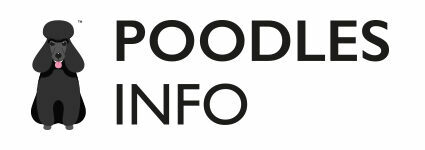Poodle Food
For poodle owners, understanding the nutritional needs of their beloved pets is crucial for providing the best possible care and promoting overall health. In this exploration of poodle food, we delve into aspects including essential nutrients, common food allergies, food brands, feeding schedules, and recipes for homemade meals. Additionally, we’ll discuss supplements and the significance of weight management and exercise in maintaining the wellbeing of these elegant and intelligent dogs.
Poodle Nutrition Basics
Poodles, like all dogs, require a well-balanced diet with the right combination of essential nutrients to maintain optimal health. One of the most critical elements in a poodle’s diet is protein, as it serves as the building block for strong muscles, healthy skin, and a robust immune system.
High-quality protein sources such as lean meats, fish, and poultry should make up a significant portion of their daily food intake. It is important to ensure that the protein source is appropriate and digestible for your poodle, as some dogs may have allergies or intolerances to certain proteins.
In addition to protein, fats play a crucial role in a poodle’s diet, as they provide a concentrated source of energy and aid in the absorption of fat-soluble vitamins like vitamins A, D, E, and K. Essential fatty acids, including omega-3 and omega-6, are crucial for maintaining healthy skin, coat, joints, and brain function.
Some excellent sources of healthy fats for poodles are fish oils, flaxseed, and coconut oil. Moderation is essential with fats, as excessive intake can lead to obesity and related health issues.
Carbohydrates are another essential component of a poodle’s diet, as they serve as an energy source and help maintain healthy digestive function. However, not all carbohydrates are created equal, and it’s crucial to select high-quality, easily digestible sources for your poodle.
Whole grains like brown rice, oats, and barley are preferable to processed grains like corn or white rice. Fruits, vegetables, and legumes can also be beneficial carbohydrate sources and provide essential vitamins, minerals, and dietary fiber.
Ensuring an adequate intake of vitamins and minerals is also a fundamental aspect of poodle nutrition. These micronutrients play a vital role in maintaining normal body functions, immune system health, and overall well-being.
Some key vitamins for poodles include vitamin A for healthy vision, vitamin D for bone health, and vitamin E for antioxidant protection. Minerals such as calcium, phosphorus, potassium, and magnesium are also essential for strong bones, proper nerve function, and fluid balance.
It’s crucial to consult your veterinarian when it comes to vitamin and mineral supplementation, as an improper balance can cause health issues.
Lastly, proper hydration is an often-overlooked aspect of poodle nutrition. Providing your poodle with easy access to fresh, clean water is of utmost importance to maintain healthy bodily functions and prevent dehydration. Also, be mindful of the water content in your poodle’s food, as some dry kibble may not provide adequate moisture, making it essential to ensure a separate source of water. By staying informed about these essential nutrients and providing a balanced diet, you’ll be well-equipped to keep your poodle happy and healthy for years to come.
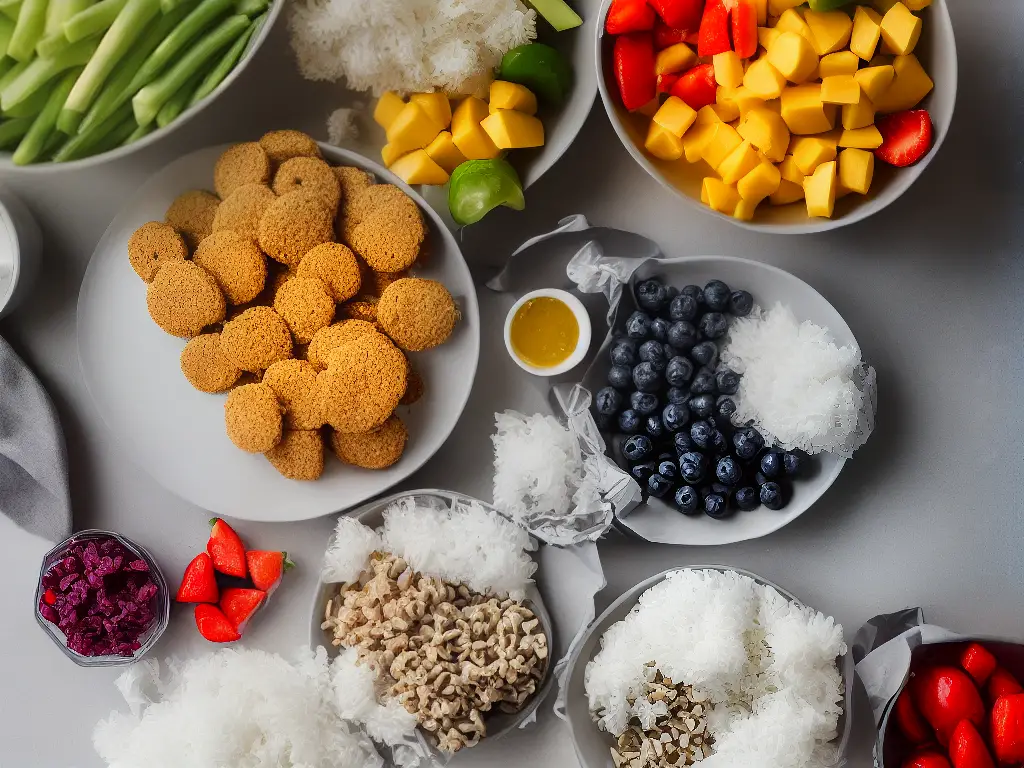
Common Poodle Food Allergies
Moreover, poodles, like any other breed, can be prone to food allergies and sensitivities. Food allergies occur when a dog’s immune system mistakenly identifies a particular ingredient as harmful and launches a defense against it. This can result in a variety of symptoms, including skin irritation, gastrointestinal issues, and a generally decreased quality of life. Therefore, being aware of your poodle’s allergy or sensitivity triggers is vital for maintaining optimal health and well-being.
Among the common food allergens for poodles are grains, certain meats, and dairy products. However, it should be noted that every dog is unique, and what may cause an allergic reaction in one poodle might not be an issue for another.
Grain Allergies
Grain allergies are a common cause of food sensitivities in poodles. Some dogs have difficulty digesting grains such as wheat, corn, and soy, which can lead to uncomfortable symptoms like itching, hair loss, and gastrointestinal problems. To manage a grain allergy, it’s essential to provide your poodle with a grain-free diet. Many high-quality pet food brands on the market offer grain-free options, using alternative carb sources like potatoes or legumes. This can help alleviate your poodle’s symptoms and promote overall health.
Meat Allergies
Another common food allergen for poodles is certain types of meat, with beef and chicken being the most common culprits. If your poodle is experiencing ongoing skin issues, ear infections, or digestive troubles, it may be worth exploring a diet that excludes these protein sources. Switching to a limited ingredient diet or a novel protein source, such as lamb, venison, or fish, can help identify and eliminate any meat-related allergens causing your poodle’s issues.
Dairy Allergies
Dairy products are also potential allergens for poodles, as some dogs are lactose intolerant or allergic to the proteins found in cow’s milk. Giving your dog high lactose-containing foods like cheese, milk, or yogurt may result in symptoms like digestive upset, diarrhea, and skin problems. To manage a dairy allergy, it’s important to avoid feeding your poodle any dairy-based treats and opt for dog foods that do not contain milk products as ingredients.
Understanding Poodle Food Needs
Poodles, like any dog breed, require a balanced and tailored diet that takes into account their breed-specific needs and any potential food allergies or sensitivities that they may have. Some poodles may have sensitivities towards specific additives or artificial ingredients found in some commercial pet foods. In such cases, opting for limited-ingredient or natural dog food that avoids unnecessary additives can be beneficial. It is important to consult with your veterinarian before making any significant changes to your poodle’s diet and to closely monitor their reaction to new foods.
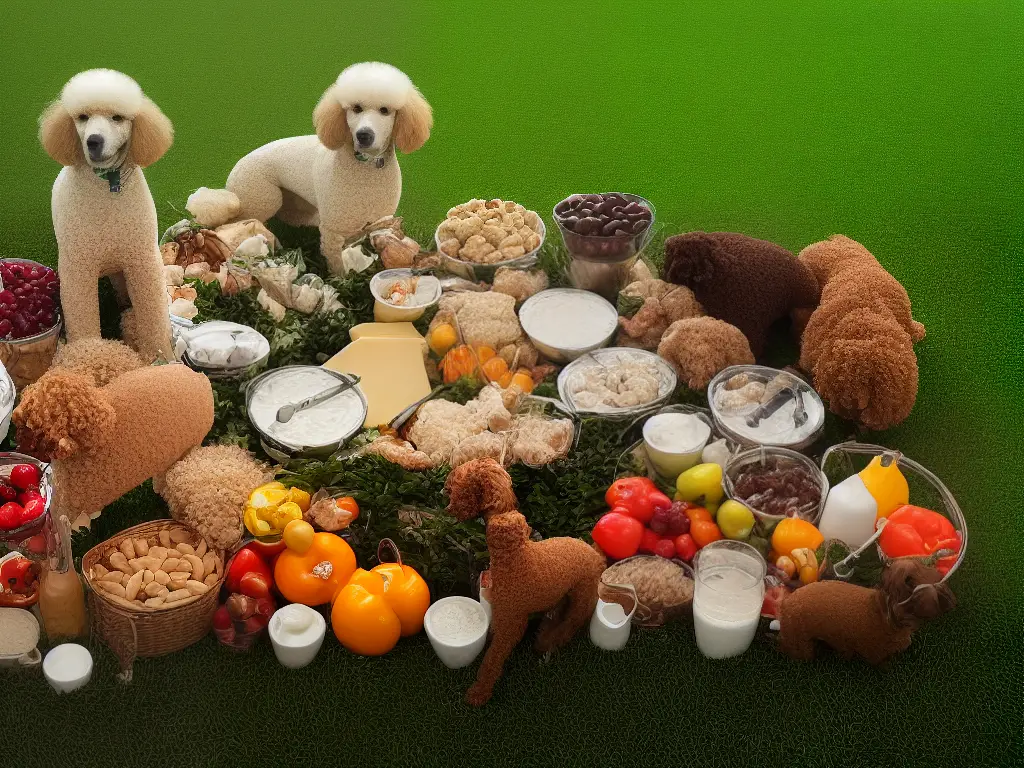
Poodle Food Brands and Types
A reputable brand that offers food options specifically designed for poodles is Royal Canin. Their recipes cater to poodles’ nutritional requirements based on age, size, and activity level. For example, Royal Canin has an exclusive Poodle Adult Dry Dog Food formula created for purebred poodles over ten months old. This formula includes key ingredients such as chicken, brown rice, and fish oil to support poodles’ muscle tone, coat health, and overall well-being. By understanding and addressing their unique dietary needs, you can ensure your poodle’s optimal health and happiness.
Another well-known pet food brand that offers poodle food options is Blue Buffalo. Their Wilderness line, made with high-quality protein sources such as deboned chicken, turkey meal, and fish meal, ensures that the poodle receives an optimal level of nutrition. This particular line is also grain-free, making it suitable for poodles suffering from food sensitivities or allergies. Moreover, these recipes are enriched with antioxidants, vitamins, and minerals to support the immune system and maintain an ideal weight for your poodle.
Hill’s Science Diet is another popular dog food brand that offers various options for poodles, depending on their age, size, and specific requirements. For example, Hill’s Science Diet Adult Sensitive Stomach & Skin Small Breed Dry Dog Food is specially formulated for small breed dogs, like poodles, with sensitive stomachs and skin. This recipe contains prebiotics, antioxidants, and omega-6 fatty acids, promoting digestive health, a strong immune system, and a healthy coat.
Wellness is another pet food brand that offers poodle food options in both dry kibble and wet food varieties. Their Wellness Complete Health line is specifically designed to meet the nutritional needs of small breed dogs, including poodles. This line contains deboned turkey, oatmeal, and peas as the main ingredients, providing high-quality protein to support lean muscle development, dietary fiber for easy digestion, and essential vitamins and minerals for overall health.
One brand to consider when looking for poodle food is Nutro, which offers a range of natural and grain-free options. Their Nutro Wholesome Essentials Small Breed Adult Dry Dog Food is specifically designed for small breed dogs like poodles. Key ingredients include farm-raised chicken, whole brown rice, and split peas, which provide essential nutrients along with natural fiber and antioxidants to support healthy digestion, a strong immune system, and optimal body weight in poodles.
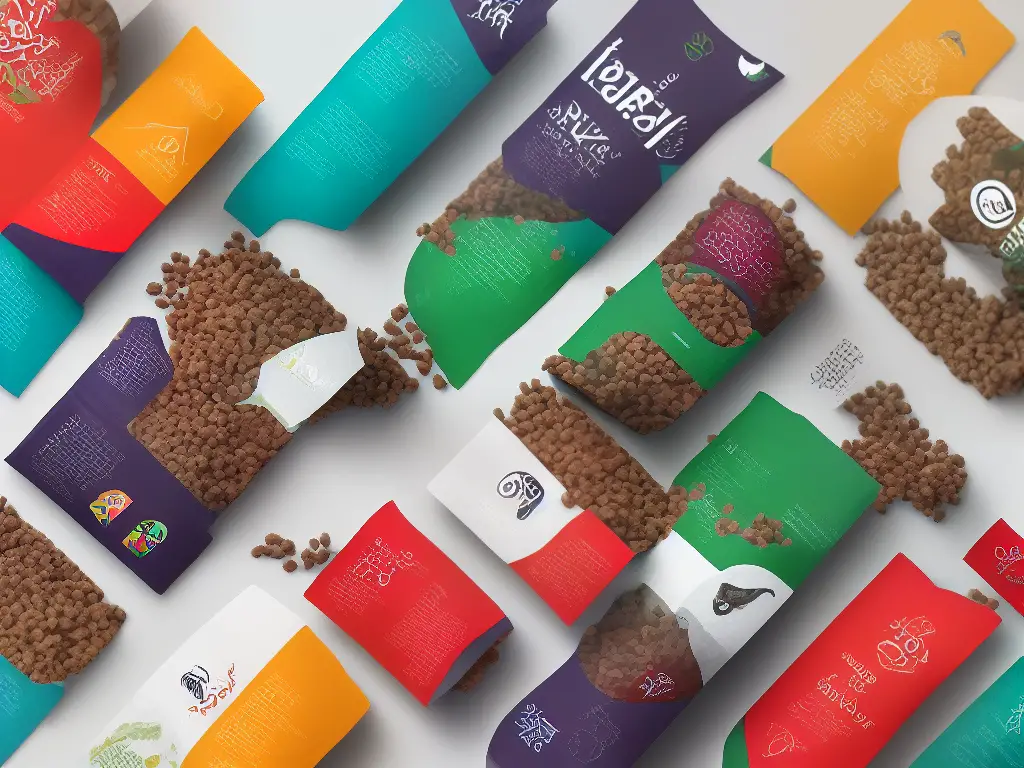
Feeding Schedule and Portion Control
After choosing the right food for your poodle, it’s crucial to establish an appropriate feeding schedule and portion sizes to provide optimal nutrition and ensure their health and happiness. Factors that contribute to these decisions include the dog’s age, size, activity level, and overall health. By considering these aspects, you will be better equipped to meet the dietary needs of your poodle, contributing to a long and healthy life.
Age: Puppies generally require more frequent meals and smaller portion sizes compared to adult dogs. It’s recommended to feed poodle puppies three to four times a day until they reach six months of age, after which you can reduce the frequency to two meals a day. Similarly, portion sizes for puppies must accommodate their rapid growth and development. As your poodle matures, consult with a veterinarian or follow the guidelines provided by a high-quality dog food brand to determine appropriate portion sizes and adjust them accordingly as your dog ages.
Size and Activity Level: Poodles come in three main size varieties: toy, miniature, and standard. Each of these sizes will have different caloric requirements that need to be considered when determining portion sizes. Generally, larger dogs require higher caloric intake, while smaller dogs need fewer calories. A highly active poodle will also require more calories to maintain proper energy levels, while a less active or more sedentary dog might require a more conservative dietary plan to avoid issues such as obesity.
Overall Health: If your poodle is prone to certain health conditions, such as allergies, diabetes, or obesity, it’s essential to provide a tailored diet plan that accommodates their specific needs. Consulting with your veterinarian is the best way to ensure a safe and effective dietary plan for your poodle facing health challenges, taking into account any necessary adjustments to portion sizes or the frequency of feeding.
Monitoring: Determining appropriate feeding schedules and portion sizes for your poodle starts with monitoring their weight and overall body condition. By keeping track of these aspects, you can better assess if alterations need to made to their diet plan. This proactive approach helps prevent potential health complications, such as undernourishment or obesity, and contributes to the overall well-being of your poodle. It is important to remember that every dog’s needs are unique, and consulting with a veterinarian is always recommended to address any concerns or questions regarding your pet’s dietary needs.
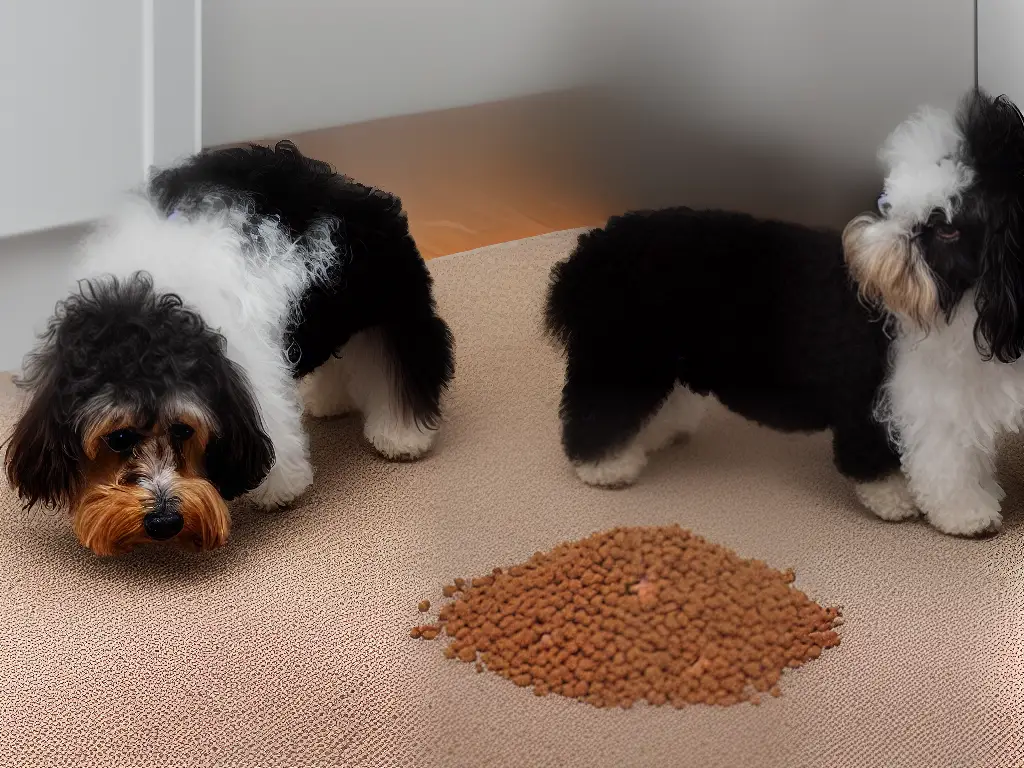
Homemade Poodle Food Recipes
One way to cater to your poodle’s nutritional requirements is by trying out simple and nutritious homemade meals made with lean protein, vegetables, and grains. For instance, you can use lean ground chicken or turkey, brown rice, and finely chopped vegetables like carrots, peas, and spinach. Begin by browning the meat in a large pan until it’s cooked through. Add in the vegetables and let them cook for a few minutes until softened. Lastly, mix in the cooked brown rice, ensuring everything is well combined. Serve it cool as this meal provides the necessary proteins, carbohydrates, and vitamins to maintain a healthy diet for your furry companion.
Another homemade poodle food recipe is a delicious twist on a classic dish. Similar to a shepherd’s pie, this delectable meal incorporates layers of ingredients, ensuring your poodle gets a taste of everything they need. Start with ground beef or lamb, cooked and seasoned with canine-friendly herbs like parsley or rosemary. Mix in vegetables like peas, carrots, and squash to add texture and vitamins. Layer this mixture into a casserole dish, top with cooked and mashed sweet potatoes, and bake for about 20 minutes until the sweet potato layer is slightly crispy. This tasty recipe offers a complete meal for poodles while focusing on using fresh, wholesome ingredients.
Fish is another excellent source of protein for poodles, and incorporating it into a homemade meal can provide essential omega-3 fatty acids to your pet’s diet. One tasty fish-based recipe is to use salmon, quinoa, and vegetables. Begin by cooking fresh or frozen deboned salmon in the oven or on the stovetop until it flakes easily with a fork. Meanwhile, cook quinoa according to package instructions and steam vegetables like green beans, zucchini, and carrots separately. Once all the ingredients are cooked, combine and serve cooled to make a delicious, nutritious meal packed with protein, vitamins, and minerals.
To provide a tasty and nutrient-rich meal for poodles that enjoy slow-cooked meals, a crockpot recipe can be a good choice. Fill your slow cooker with boneless, skinless chicken breasts, sweet potatoes, peas, and diced carrots. Additionally, you can add a bit of olive oil, cooked quinoa or brown rice, and low-sodium chicken broth to ensure that the meal stays moist and fluffy. Cook on low for 6-8 hours, then shred the chicken and mix everything together. This delightful, slow-cooked meal is convenient for busy pet parents and is sure to satisfy even the pickiest poodle palate.
Poodles with allergies or specific dietary needs may benefit from a homemade meal tailored to their requirements. A grain-free recipe with limited ingredients can help you manage your pet’s sensitivities while still providing a nutritious and tasty meal. Choose a lean protein source like ground turkey, venison, or rabbit and mix with easily digestible vegetables, such as pumpkin or butternut squash. You can also add supplements, such as fish oil, probiotics, or vitamins, to ensure your poodle is receiving a balanced diet that meets their specific needs. Consult with your veterinarian for appropriate guidance and recommendations to create a personalized recipe for your furry friend.
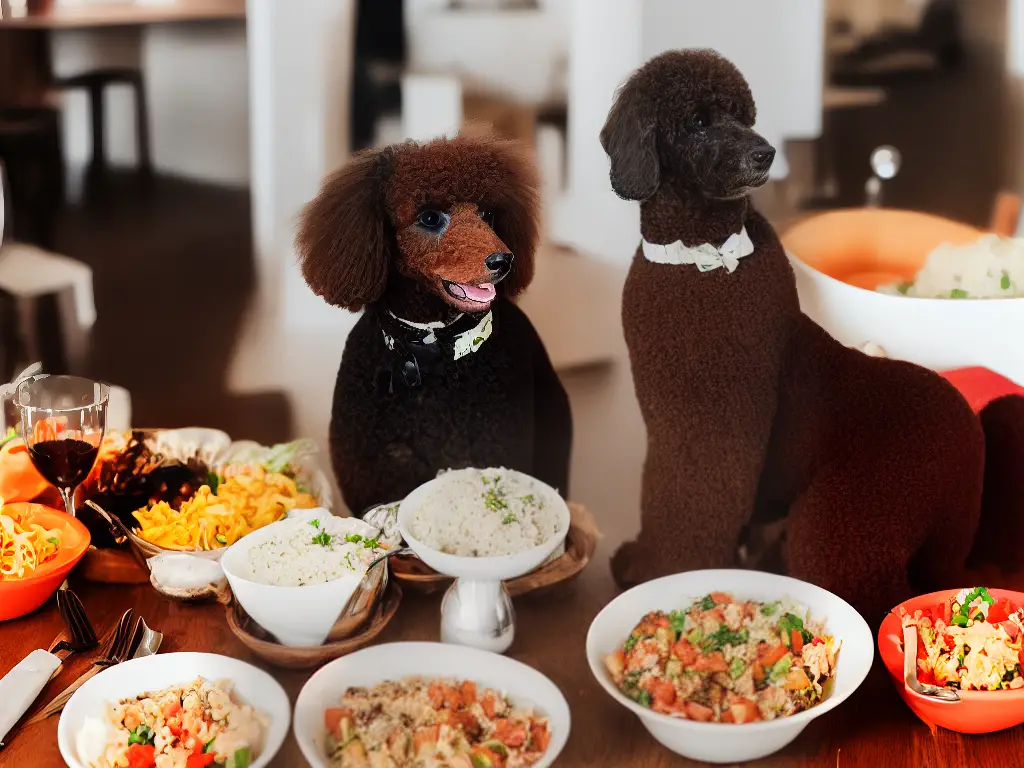
Poodle Food Supplements
Aside from the homemade meals, poodle food supplements play an important role in maintaining the overall health and well-being of this popular dog breed. Like all dogs, poodles require a balanced diet that meets their specific nutritional needs. However, some pet owners may want to go the extra mile and provide their poodle with supplementary vitamins and nutrients to ensure they are receiving all the essential components for optimal health. By incorporating these food supplements into the custom-made meals, you can further enhance your poodle’s diet and overall well-being.
One common supplement for poodles is a high-quality multivitamin, which provides an array of crucial vitamins and minerals that may not always be present in commercial dog food.
Another essential nutrient for poodles is Omega-3 fatty acids, which play a crucial role in skin and coat health, brain function, and reducing inflammation. Adding sources of Omega-3 acids, like fish oil supplements, to your poodle’s diet can help combat skin allergies, which are quite common in this breed. Omega-3 fatty acids can also help support joint health, an important consideration for poodles, which can be prone to developing hip dysplasia and other joint issues.
In addition to Omega-3 fatty acids, poodles can benefit from glucosamine and chondroitin supplements. These supplements can be especially beneficial for elderly poodles or those suffering from joint issues like arthritis, hip dysplasia, or patellar luxation.
Probiotics are another supplement that can be beneficial for poodles. A healthy gut flora is essential for overall health, and providing a probiotic supplement can help boost the beneficial bacteria in their gut, promoting better digestion and overall immune function.
Antioxidants are essential nutrients that can benefit poodles, as they help fight off harmful free radicals within their bodies, promoting cell health and potentially reducing the risk of cancer and other diseases. Many commercial dog foods contain natural antioxidants, but some poodle owners prefer to provide additional antioxidant supplements to further bolster their pet’s health. Good sources of antioxidants for pets include vitamin E, vitamin C, and selenium. However, it is crucial to consult with a veterinarian before starting your poodle on any new supplement regimen to ensure the proper dosage and safety.

Weight Management and Exercise
In addition to providing a balanced diet that includes essential nutrients like antioxidants, maintaining an ideal weight and engaging in regular exercise are critical factors in ensuring your poodle’s overall health and well-being. A proper diet and exercise routine can help prevent potential health issues like obesity, diabetes, heart conditions, and joint problems. Poodle owners should understand that different poodles have varying nutritional requirements, depending on factors such as age, size, and activity levels.
One way to manage your poodle’s weight effectively is by monitoring their daily caloric intake. This involves feeding them a balanced diet made specifically for poodles that meets all their nutritional needs. Commercially available poodle food generally contains high-quality protein and an appropriate amount of fats and carbohydrates. However, you must consult your veterinarian to determine the best type and amount of food for your individual pet based on factors such as their size, age, and activity levels. Overfeeding can result in obesity, increasing the risk of developing more severe health problems mentioned earlier.
In addition to feeding your poodle a balanced diet, regular exercise is vital for weight management and overall health. Exercise helps burn excess calories, strengthens their muscles, and keeps their joints supple. Poodles are an intelligent and active breed, which means they require daily physical and mental stimulation. You can engage your pet in various activities such as jogging, swimming, playing fetch, or practicing agility exercises to keep them happy and healthy. Engaging your poodle in these activities not only contributes to their physical well-being but also helps in strengthening your bond with them.
Monitoring your poodle’s weight can be a quick and straightforward routine that can prevent potential health issues later on. Regularly weighing your poodle and noting any rapid changes in weight will help you identify any problems early on and make the necessary adjustments to your pet’s diet and exercise routine. It is also advisable to conduct routine veterinary check-ups to monitor your pet’s health and ensure their nutritional needs are met effectively.
Understanding your poodle’s body condition score, which involves assessing your pet’s overall body shape, is another essential aspect of weight management. By familiarizing yourself with what an ideal body weight looks like for your poodle, you become better equipped to recognize when your pet may be gaining or losing too much weight. Monitoring their physical appearance, alongside weight tracking and veterinary check-ups, will ensure that you keep your poodle in optimal condition and help prevent potential health issues related to poor weight management.

To sum up, a comprehensive understanding of poodle nutrition and diet ensures that our furry friends thrive throughout their lives. By being aware of essential nutrients, potential allergies, and suitable food brands, as well as following ideal feeding schedules and incorporating recipes and supplements as needed, we set our poodles up for success. Thus, taking an informed approach to our beloved pets’ diet and exercise contributes to a happier, healthier, and more fulfilling life for both poodle and owner.
